 Petzlover
Petzlover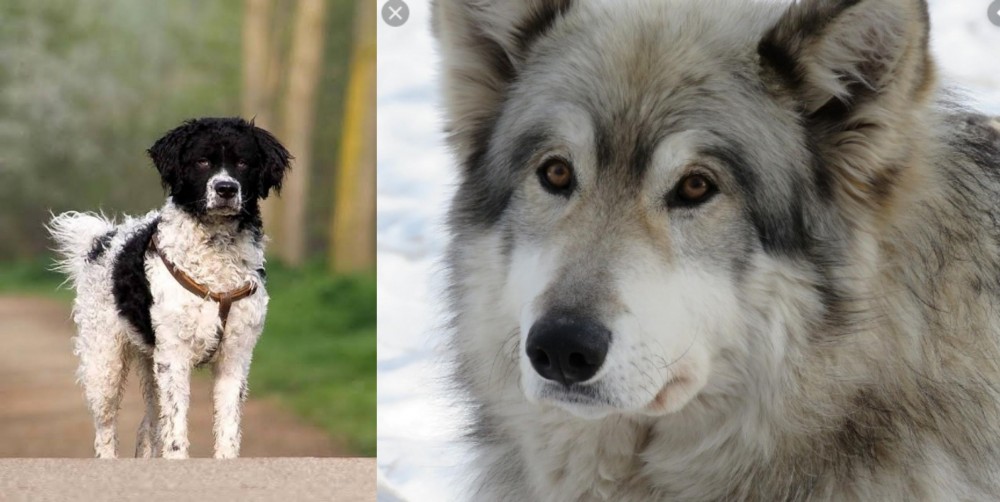 Wetterhoun is originated from Netherlands but Wolfdog is originated from Germany. Wetterhoun may grow 17 cm / 6 inches shorter than Wolfdog. Wetterhoun may weigh 10 kg / 22 pounds lesser than Wolfdog. Both Wetterhoun and Wolfdog has almost same life span. Both Wetterhoun and Wolfdog has almost same litter size. Both Wetterhoun and Wolfdog requires Moderate Maintenance.
Wetterhoun is originated from Netherlands but Wolfdog is originated from Germany. Wetterhoun may grow 17 cm / 6 inches shorter than Wolfdog. Wetterhoun may weigh 10 kg / 22 pounds lesser than Wolfdog. Both Wetterhoun and Wolfdog has almost same life span. Both Wetterhoun and Wolfdog has almost same litter size. Both Wetterhoun and Wolfdog requires Moderate Maintenance.
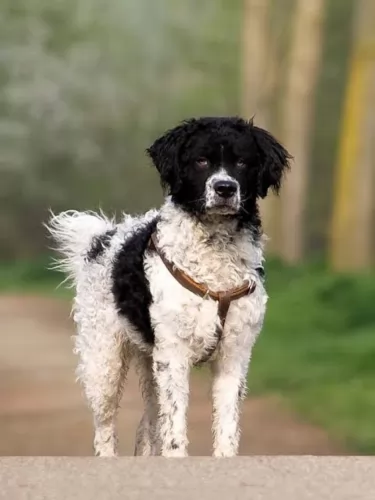 The Wetterhoun is a water dog developed in the 1500 or 1600s to hunt otters. The breed was developed by the Frisians in the Netherlands near the Northwest corner. In addition to catching otters in the lakes near by, they were also used as gundogs to hunt game. They are a fearless, tough and loyal working dog. They love the water and they are build for it with a waterproof coat and tight tail that is spiraled. They will swim happily in freezing cold weather as well.
The Wetterhoun is a water dog developed in the 1500 or 1600s to hunt otters. The breed was developed by the Frisians in the Netherlands near the Northwest corner. In addition to catching otters in the lakes near by, they were also used as gundogs to hunt game. They are a fearless, tough and loyal working dog. They love the water and they are build for it with a waterproof coat and tight tail that is spiraled. They will swim happily in freezing cold weather as well.
The Wetterhoun is rare and not seen outside of the Netherlands. Descendent of the Water Dog, that is now extinct, he is probably a relative of many spaniel types that also call the Water Dog their ancestor. Yet the Wetterhoun is not a spaniel or spaniel type.
The breed almost disappeared during World War II, like many others, they brought back and are now becoming more and more popular. The breed is only recognized by the Federation Cynologique Internationale and the United Kennel Club. AKC does not recognize them, but there are many hunting clubs and other registries that do. They are often promoted as one of the rare breeds.
 The Wolfdog was brought about when domestic dogs were mated with a variety of wolves so as to produce a hybrid.
The Wolfdog was brought about when domestic dogs were mated with a variety of wolves so as to produce a hybrid.
People who want to own these hybrids have to be careful because they find that the unpredictable behavior of their pets makes it difficult for them to care for them.
Then they want to get rid of it. Every year, heaps of these hybrids are abandoned due to humans interfering with nature.
The wolfdog has been bred with a number of dogs but we think about it more in terms of wolf and German shepherd.
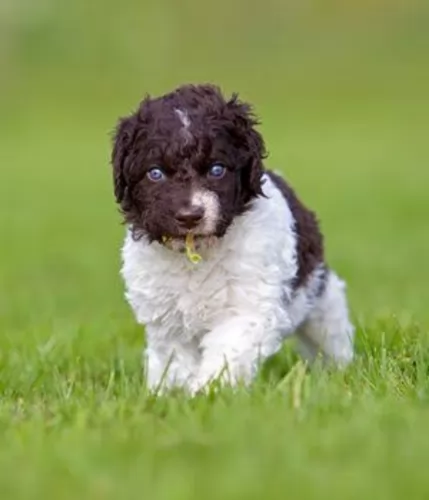 The Wetterhoun is a compact, medium sized breed weighing about 55 to 77 pounds. Great water dogs they are athletically built with low set ears hanging next to their heads, a waterproof coat, distinctive eyes with a very serious expression and a tightly curled tail held aloft over the back. Their coat is waterproof, somewhat oily, curly and thick. The fur is of a smoother texture on the ears, head, and legs. They can be solid black, solid brown, brown with white, or black with white.
The Wetterhoun is a compact, medium sized breed weighing about 55 to 77 pounds. Great water dogs they are athletically built with low set ears hanging next to their heads, a waterproof coat, distinctive eyes with a very serious expression and a tightly curled tail held aloft over the back. Their coat is waterproof, somewhat oily, curly and thick. The fur is of a smoother texture on the ears, head, and legs. They can be solid black, solid brown, brown with white, or black with white.
 People mesmerized by the wolf long to bring some of that wildness home, and the wolfdog is supposed to do this.
People mesmerized by the wolf long to bring some of that wildness home, and the wolfdog is supposed to do this.
Their looks differ a lot, even those that come from the same litter. You can’t have a predictable looking wolf dog because it could be any domestic dog bred with a wolf so they display a large variety of appearances.
Most Wolfdogs seem to have smaller heads than pure wolves. The ears seem to be bigger and more pointy.
A popular wolfdog mix is a German Shepherd mixed with the wolf. These dogs can be between 70 to 76cm in height and weigh between 40 and 45kg.
Their coat is thick and can be in colors of grey, cream, red, white, dark brown and black.
While the wolfdog can be trained to become quite a friendly kind of dog, it is not suitable for the first time dog owner. It can show bouts of aggressiveness around strangers and be highly protective of its family.
However, this can be helped with early socialization and training. It is illegal to own the wolfdog in some states. You don’t want to leave a wolfdog alone with your children even though the dog is capable of love and loyalty towards his human family.
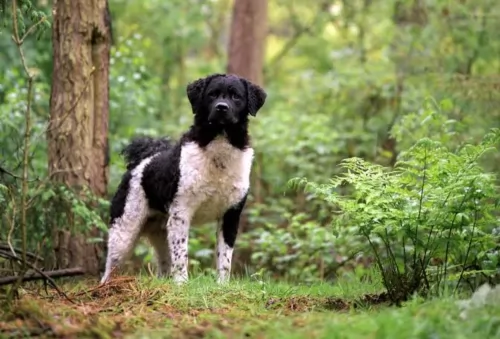 3.Adaptability – not a great apartment dog even though he is not that big. They need space. They need a job and they will finish their job at their own pace no matter what you say. It is impossible to train this trait out of them.
3.Adaptability – not a great apartment dog even though he is not that big. They need space. They need a job and they will finish their job at their own pace no matter what you say. It is impossible to train this trait out of them.
4.Learning ability Very high learning ability, very eager to learn and very smart. He is stubborn about finishing whatever job he is working on
 When you add the genes of a wild animal to the pool, you get a crossbreed and when its an animal from the wild, its nature is unpredictable.
When you add the genes of a wild animal to the pool, you get a crossbreed and when its an animal from the wild, its nature is unpredictable.
Many people don’t think about the consequences of what they do when they interfere with nature and the wolfdog gets put down when it behaves like a wild animal and attacks or bites out of defense.
Yes, they can be loyal, loving pets but always you will have the shadow of the dog or wolf’s unpredictable behavior.
There is a reason why these dogs are banned in a number of states. This dog-type-wolf breed is not recommended as a pet at all – take a look at animal shelters and the number of wolf dogs there and ask yourself why.
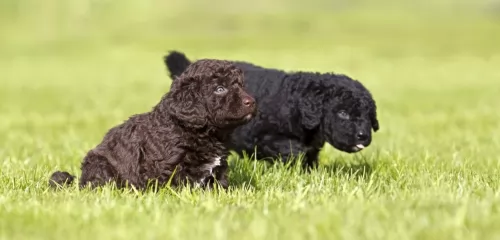 A hardy and healthy breed they do not have severe health issues. But like every his
A hardy and healthy breed they do not have severe health issues. But like every his
• Ear Infections – like any breed with hanging ears they can be prone to infection. This is particularly true because the dogs are in the water a lot. Be sure to clean and dry them after every water episode and inspect them on a regular basis even if the dog has not been in the water.
• Patellar Luxation – Knee cap issue with movement and inflammation. Can cause lameness and arthritis.
 They will also be susceptible to common dog ailments such as parasites and hip dysplasia.
They will also be susceptible to common dog ailments such as parasites and hip dysplasia.
Like any other dog, these Wolf dogs will also possibly develop tumors. He will also need to be vaccinated against harmful diseases and you will need to have a reliable local vet who is interested in your wolf dog.
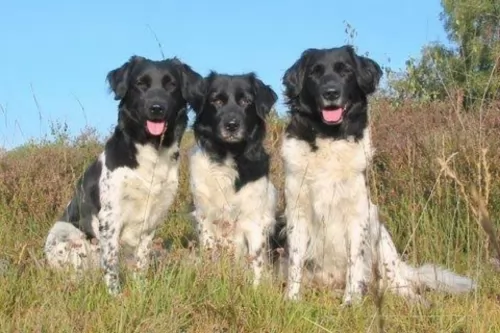 1Feeding the puppy -This is an active, hunting and swimming breed. They need good nutrition and high quality puppy food. A food formulated for active breeds or hunting dogs would be best. Feed your puppy in smaller amounts 3-4 times per day.
1Feeding the puppy -This is an active, hunting and swimming breed. They need good nutrition and high quality puppy food. A food formulated for active breeds or hunting dogs would be best. Feed your puppy in smaller amounts 3-4 times per day.
2.Feeding the adult - This is an active, hunting and swimming breed. They need good nutrition and high quality adult food. A food formulated for active breeds or hunting dogs would be best. Feed your adult twice per day.
4. Games and Exercises – This is an active working dog that needs a lot of exercise every day. A 30 minute walk is only the beginning. They need outdoor time to play and run. They need to swim if at all possible.
 If you own a wolfdog the same care procedures would need to be followed as you would with a regular dog.
If you own a wolfdog the same care procedures would need to be followed as you would with a regular dog.
A wolfdog, however, can’t be vaccinated against rabies. It seems that the reason for this is that it is due to current legislation, and vaccine manufacturers don’t want to support wolf dogs as pets because they are considered to be dangerous.
Provide your wolfdog with highly nutritional, protein-based food. You don’t want to feed your wolfdog any of the low quality, traditional store-bought food high in carbs and artificial additives. Instead, look for a diet rich in proteins and be sure to give this dog some raw meat occasionally.
The dog is active and you will need to provide heaps of exercise for him, both mental and physical activities.
The wolfdog will require training but it will require dedication, though it can be done as the dog is very intelligent.
Even with training, the wolfdog isn’t suited to life in the city but should be kept in the countryside.